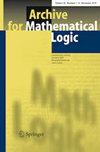具有Smital属性的理想
IF 0.4
4区 数学
Q1 Arts and Humanities
引用次数: 0
摘要
波兰群\((X,+)\)上的\(\sigma \) -理想\(\mathcal {I}\)具有Smital性质,如果对于每个稠密集D和Borel \(\mathcal {I}\) -正集B,其代数和\(D+B\)是来自\(\mathcal {I}\)的集合的补。我们考虑了这一性质的几种变体,并研究了它们与可数链条件、极大性的联系,以及它们如何通过富比尼积保持。特别地,我们证明了在Cantor空间\(2^\omega \)上存在\(\mathfrak {c}\)许多基于Borel的极大不变\(\sigma \)理想。本文章由计算机程序翻译,如有差异,请以英文原文为准。
Ideals with Smital properties
A \(\sigma \)-ideal \(\mathcal {I}\) on a Polish group \((X,+)\) has the Smital Property if for every dense set D and a Borel \(\mathcal {I}\)-positive set B the algebraic sum \(D+B\) is a complement of a set from \(\mathcal {I}\). We consider several variants of this property and study their connections with the countable chain condition, maximality and how well they are preserved via Fubini products. In particular we show that there are \(\mathfrak {c}\) many maximal invariant \(\sigma \)-ideals with Borel bases on the Cantor space \(2^\omega \).
求助全文
通过发布文献求助,成功后即可免费获取论文全文。
去求助
来源期刊

Archive for Mathematical Logic
MATHEMATICS-LOGIC
CiteScore
0.80
自引率
0.00%
发文量
45
审稿时长
6-12 weeks
期刊介绍:
The journal publishes research papers and occasionally surveys or expositions on mathematical logic. Contributions are also welcomed from other related areas, such as theoretical computer science or philosophy, as long as the methods of mathematical logic play a significant role. The journal therefore addresses logicians and mathematicians, computer scientists, and philosophers who are interested in the applications of mathematical logic in their own field, as well as its interactions with other areas of research.
 求助内容:
求助内容: 应助结果提醒方式:
应助结果提醒方式:


